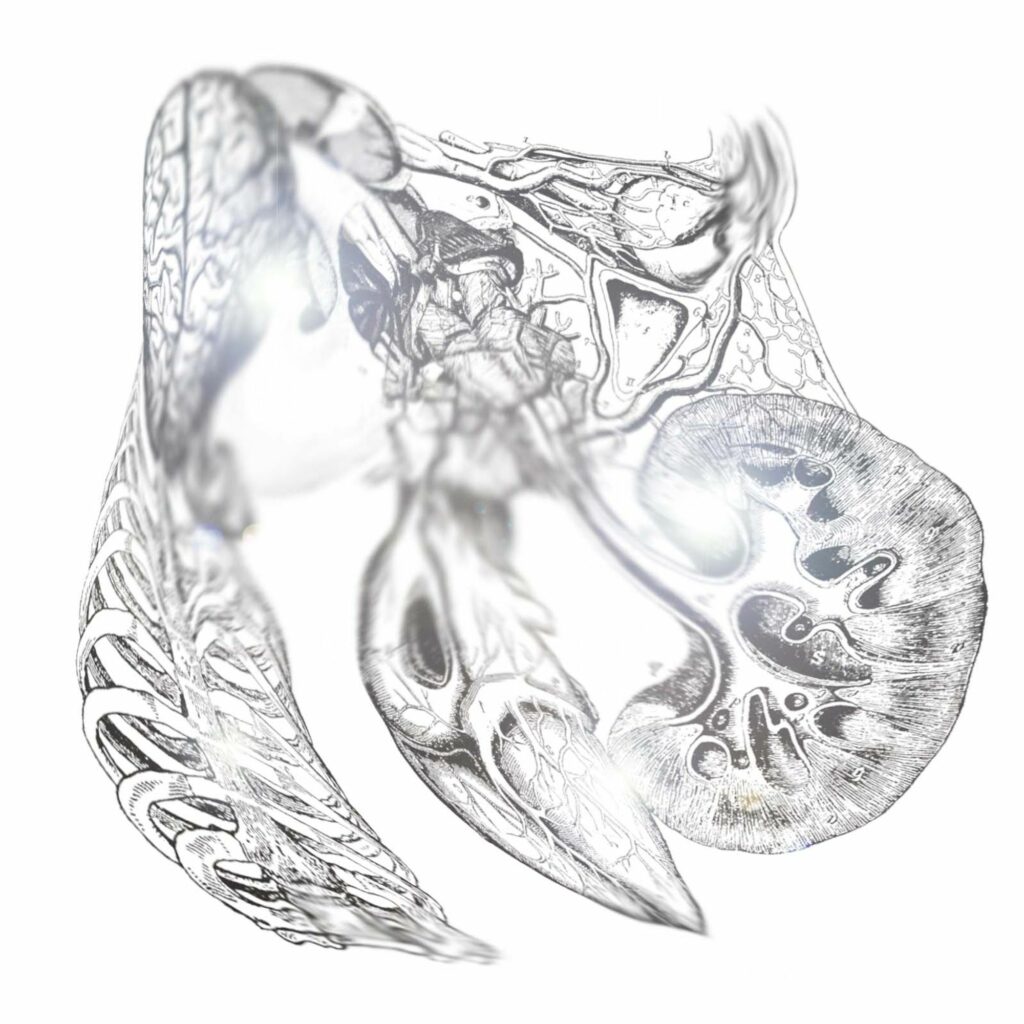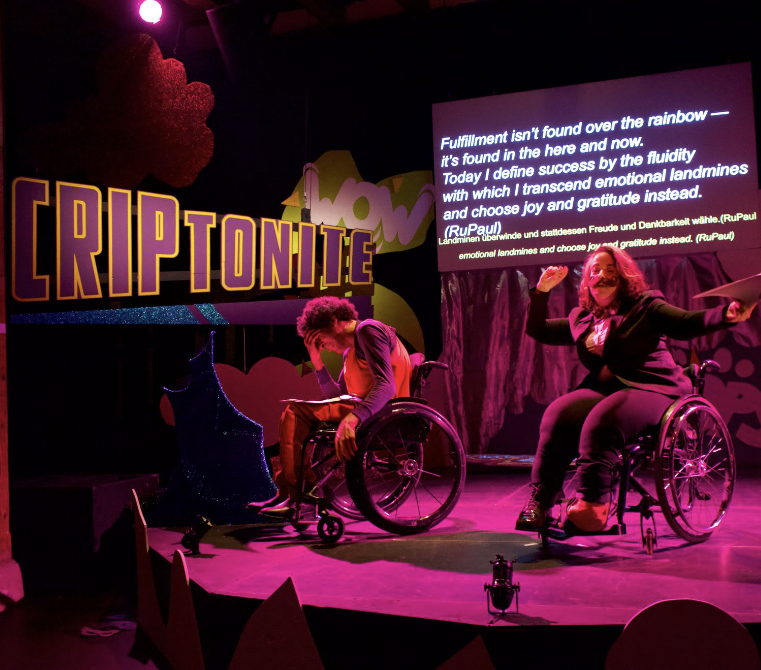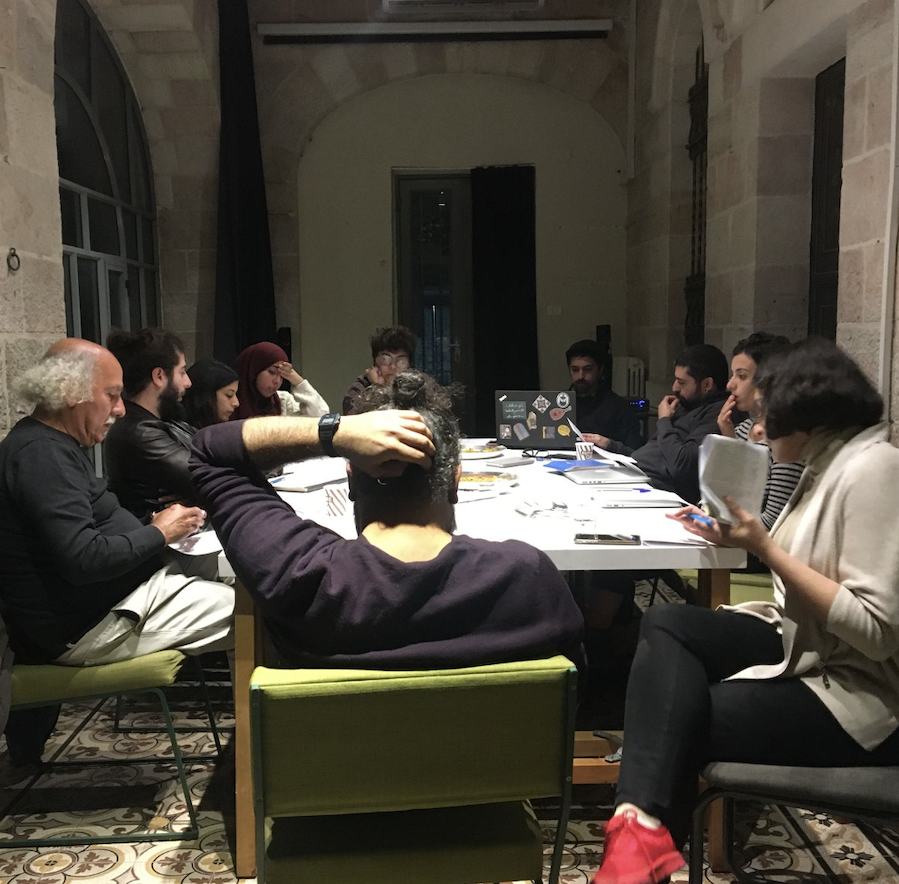
ORGANOLOGY articulates questions and concerns around the role that art (schools) might play within society in 2045, if and how art (schools) could contribute to societal changes.

Criptonite is a queer, crip theatre project based founded in 2020 by Edwin Ramirez and Nina Mühlemann. They create various performances using drag, pop culture and dark humor to highlight and discuss various aspects of the broader topic of disability and use access in creative ways to make performance spaces more accessible to disabled performers and audience members.
Edwin Ramirez (they/them) is a performance artist and stand-up comic based in Zurich. As part of their stand-up career they have been seen on all big comedy stages of the German-speaking part of Switzerland and on Swiss National Television. During the last two years Edwin was part of the ensemble for “Star Magnolia” and “Monster vs Society” both at Theater Neumarkt, as well as part of New Urgency for the performance “Hier! Tickets für die Revolution at Gessnerallee. They are also a big sci-fi nerd and have organized the occasional tabletop rpg session.

School of Intrusions is a collective of sorts practicing informal ways of gathering in and around specific urban and rural sites in Palestine. The members of the group change and fluctuate. Initiated by Noor Abed and Lara Khaldi in 2019, School of Intrusions aims to actively practice the notion of ‘commons’ in everyday work and life.
www.onassis.org/initiatives/onassis-air/collaborations/school-of-intrusions
Noor Abed is an interdisciplinary artist and filmmaker. Her practice examines notions of choreography and the imaginary relationship of individuals, creating situations where social possibilities are both rehearsed and performed. Abed attended the Whitney Independent Study Program in Νew York in 2015-16, and the Home Workspace Program (HWP) at Ashkal Alwan in Beirut in 2016-17. She received her BA from the International Academy of Arts in Palestine and a MFA from the California Institute of the Arts, Los Angeles. She was a resident at the Skowhegan School of Painting and Sculpture in Maine (2014) and a fellow in documenta (13)’s “Department of Maybe Educatiοn and Public Programs” in Kassel, Germany. A finalist and a third prize-winner in the 2014 Young Artist Award, she was awarded the March Project residency and commission from Sharjah Art Foundation (UAE) in 2016. Abed was awarded residencies at the Cité Internationale des Arts in Paris (France) in 2018, the U-jazdowski Center for Contemporary Art in Warsaw (Poland) in 2020, and Raw Material Company in Dakar (Senegal) in 2019, among others. In 2020, she co-founded, with Lara Khaldi, the “School of Intrusions,” an independent educational platform in Ramallah, Palestine. Abed is currently exploring the critical stance of ‘folklore’ as a source of knowledge, and it’s possible connection to alternative social and representational models in Palestine.
https://theoctopusprogramme.uni-ak.ac.at/index.php/noor-abed/
Lara Khaldi is a cultural worker based in Jerusalem, Palestine. She is an alumna of the De Appel Curatorial Programme, Amsterdam (2013) and the European Graduate School, Switzerland (2015). Recent projects she has co-curated include: School of Intrusions, Educational Platform with Noor Abed, Ramallah (2020); Overtone: On the Politics of Listening, exhibition and symposium, Goethe Institute, Ramallah (2019); Unweaving Narratives: Performance Program, Palestinian Museum, Birzeit (2018); Shifting Ground, satellite project of Sharjah Biennial 13, Ramallah (2017); Desires into Fossils: Monuments Without a State, a series of research exhibitions with Reem Shilleh, Khalil Sakakini Cultural Center, Ramallah (2017); Jerusalem Shows V & VI, Al Ma’mal Art Foundation, Jerusalem (2011 and 2012).
Khaldi has taught art history, theory, and exhibition practices at the International Academy of Art Palestine and Dar Al-Kalima University College of Arts and Culture, Bethlehem. Until recently she was Head of the Media Studies Program at Bard Al Quds College, Jerusalem. She has contributed to various art publications, especially around her ongoing research project on the question of museums in crisis. Forthcoming is the essay “We Are Still Alive So Remove Us from Memory: Asynchronicity and the Museum in Resistance,” in Errant Journal, Amsterdam, 2020.
Learn more about traveling in time, futures thinking and Live Action Role Play
Organology is an informal interterritorial network of co-conspirators, formed in Paris, France, in 2032. The group collectively operates from an activist standpoint, otherwise known as “Robin Hood mode”, creating advantageous diversions and interventions to strengthen the place of art in society. Their interests and interventions centre on social, political and economic interests. Organology’s initial focus began in exploring how classical music could be applied as a tool for building society. Now, in 2045, having worked together for over ten years, their membership and thus interests and activities have reached more broadly into arts, education, and culture in society. Collectively, Organology acknowledges that in today’s world artists have multiple and often contradictory professional identities and that their jobs are typically situation-specific, taking place in trans-professional contexts ranging from hospitality and well-being to education and organisation development. Their work and research is therefore responsive to these shifting social and economic contexts.
The key interest ORGANOLOGY brought to the 2045 Footnotes Conference was to identify the central conditions from which artists and arts institutions operate safely and sustainably in society today. In doing so they endeavoured to source tools and frameworks to create conditions that could: 1) Grant equal access to arts educational institutions for all; 2) Highlight the need to critically scrutinise students and participants’ backgrounds, expectations, and needs; and 3) Investigate alternative operational models of art schools with attention to the inclusion of minority and marginalised groups, access to basic income and entrepreneurship possibilities, and accessibility.

What are your favourite inputs on the futures of arts and society?
Share them with us in the comment function below.
Discussion
No feedback has been added yet
Share a Thought